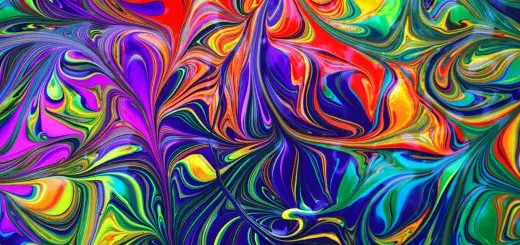What Is Chaos Magick?

Looking for more amazing products? Check out our online store and explore our collection here! Happy shopping!
Before diving in, please note: This post is for informational purposes only. If you’d like to know more about how we approach topics, feel free to check out our friendly Disclaimer Page.
Hey there, amazing readers! 
We’re committed to delivering quality posts, and your support (even just sticking around despite the ads) means everything to us. So, bear with us, and thanks for helping us keep the good vibes rolling. Now, on to the fun stuff!
TRANSLATE BUTTON AT THE END OF THE ARTICLE
Introduction to Chaos Magick
Chaos Magick is a modern occult practice that emerged in the late 20th century, combining elements of traditional ritual magic, psychology, and postmodern philosophy.
Unlike other magical traditions, Chaos Magick emphasizes personal experimentation and adaptation, allowing practitioners to create their own belief systems and rituals based on what works for them.
This fluid and flexible approach has made Chaos Magick popular among those seeking a more eclectic and individualized spiritual path.
Origins and History of Chaos Magick
Chaos Magick originated in the 1970s with the work of occultists Peter J.
Carroll and Ray Sherwin, who founded the Illuminates of Thanateros (IOT), a magical order dedicated to exploring new approaches to magic.
Inspired by the work of Aleister Crowley, Austin Osman Spare, and other occult thinkers, Carroll and Sherwin developed Chaos Magick as a way to break free from the rigid structures of traditional magical systems and tap into the raw, chaotic forces of the universe.
Principles of Chaos Magick
At the core of Chaos Magick is the belief that belief itself is a tool that can be used to shape reality.
Practitioners are encouraged to adopt beliefs and techniques that are personally meaningful and effective, regardless of their historical or cultural origins.
This pragmatic approach to magic emphasizes results over dogma, allowing individuals to experiment with different methods and discard what does not work for them.
Beliefs and Practices in Chaos Magick
Chaos Magick draws on a diverse range of beliefs and practices from various magical traditions, including ceremonial magic, shamanism, and witchcraft.
These influences are combined and adapted in unique ways to suit the individual practitioner’s needs and goals.
Some common practices in Chaos Magick include meditation, visualization, energy work, and the creation of sigils, symbols that represent the practitioner’s desires and intentions.
Techniques and Tools in Chaos Magick
Chaos Magick utilizes a variety of techniques and tools to work with magical energies and manifest intentions.
These can range from simple rituals performed with everyday objects to elaborate ceremonies involving incantations and invocations.
The use of symbolism, color, sound, and movement are also common in Chaos Magick rituals to create a focused and powerful magical environment.
Sigils and Chaos Magick
One of the most well-known practices in Chaos Magick is the creation and use of sigils.
Sigils are created by taking a statement of intent, removing the vowels and repeating letters, and then combining the remaining letters into a unique symbol.
The sigil is then charged with energy and released into the unconscious mind to manifest the desired outcome.
This technique is based on the idea that bypassing the conscious mind can make magic more effective.
Rituals in Chaos Magick
Rituals in Chaos Magick can be highly personalized and tailored to the individual practitioner’s preferences.
While some practitioners may choose to follow traditional magical rituals, others may create their own rituals based on intuition and inspiration.
The key is to engage with the ritual in a focused and intentional manner, allowing the practitioner to connect with their deepest desires and intentions on a subconscious level.
The Role of Belief in Chaos Magick
Belief is a central tenet in Chaos Magick, as practitioners are encouraged to adopt beliefs that resonate with them personally, rather than adhering to a specific dogma or tradition.
This fluid approach to belief allows practitioners to draw on a wide range of magical systems and philosophies, adapting them to suit their own needs and goals.
By harnessing the power of belief, practitioners can shape their reality and manifest their desires through focused intention and magical practice.
Influence of Psychology in Chaos Magick
Psychology plays a significant role in Chaos Magick, as practitioners often draw on psychological theories and techniques to enhance their magical practice.
By understanding the workings of the mind and the power of the subconscious, practitioners can create rituals and techniques that are tailored to their psychological needs and goals.
This integration of psychology and magic allows practitioners to work with their own minds to create profound and lasting changes in their lives.
Chaos Magick and the Occult
While Chaos Magick shares some similarities with traditional occult practices, such as ceremonial magic and witchcraft, it also diverges in significant ways.
Chaos Magick rejects the idea of a fixed, objective reality and embraces the concept of subjective reality, where belief and intention shape the world around us.
This radical approach to magic challenges conventional ideas about the nature of reality and opens up new possibilities for personal growth and transformation.
Modern Applications of Chaos Magick
In the modern world, Chaos Magick continues to attract a diverse range of practitioners who are drawn to its innovative and experimental approach to magic.
From artists and writers seeking creative inspiration to professionals looking to enhance their productivity, Chaos Magick offers a versatile toolkit for personal development and spiritual exploration.
By harnessing the power of belief, intention, and creativity, practitioners can unlock new possibilities and transform their lives in profound ways.
Criticisms and Controversies of Chaos Magick
Like any esoteric practice, Chaos Magick has its share of critics and controversies.
Some traditional occultists argue that Chaos Magick lacks the depth and historical significance of more established magical traditions, dismissing it as a passing fad or a watered-down version of true magic.
Others criticize Chaos Magick for its emphasis on personal experience over objective truth, questioning the validity of a magical practice that is based on subjective belief.
Despite these criticisms, Chaos Magick continues to attract a devoted following of practitioners who value its pragmatic, results-oriented approach to magic.

The Enlightenment Journey is a remarkable collection of writings authored by a distinguished group of experts in the fields of spirituality, new age, and esoteric knowledge.
This anthology features a diverse assembly of well-experienced authors who bring their profound insights and credible perspectives to the forefront.
Each contributor possesses a wealth of knowledge and wisdom, making them authorities in their respective domains.
Together, they offer readers a transformative journey into the realms of spiritual growth, self-discovery, and esoteric enlightenment.
The Enlightenment Journey is a testament to the collective expertise of these luminaries, providing readers with a rich tapestry of ideas and information to illuminate their spiritual path.
Our Diverse Expertise
While our primary focus is on spirituality and esotericism, we are equally passionate about exploring a wide range of other topics and niches 

To ensure we provide the most accurate and valuable insights, we collaborate with trusted experts in their respective domains 
Our blog originally focused on spirituality and metaphysics, but we’ve since expanded to cover a wide range of niches. Don’t worry—we continue to publish a lot of articles on spirituality! Frequently visit our blog to explore our diverse content and stay tuned for more insightful reads.
Hey there, amazing reader! 
Check out our store here and take a peek at some of our featured products below! Thanks for being awesome!











